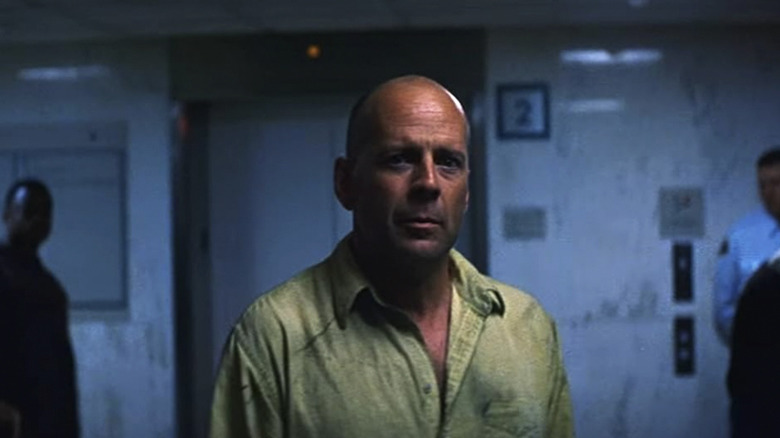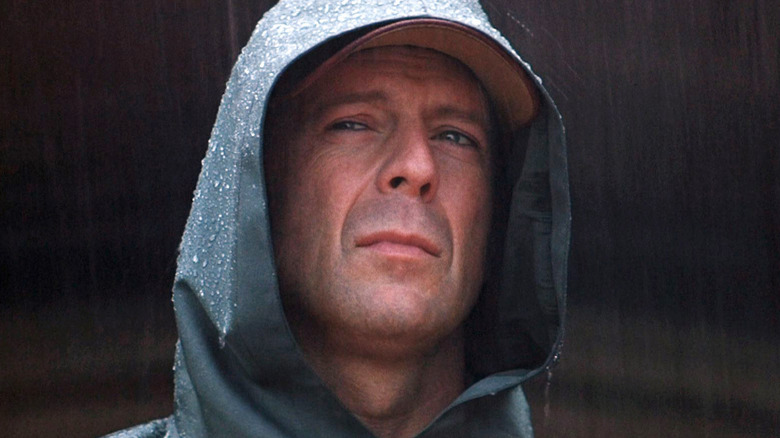When Bruce Willis vaulted from tv stardom to the motion picture big time in 1988 with “Die Hard,” he appeared destined for a future as a blue-collar rake the likes of which films had by no means seen. He possessed the incorrigibleness of Cary Grant and the two-fisted capableness of Gary Cooper, however he felt extra accessible than both of them. Willis wasn’t erudite and he wasn’t making an attempt to be. God no. His characters tended to be rough-and-tumble smartasses with ethical compasses that pointed true north, males who made their share of errors and spent the typical size of a function movie atoning for them as they went after unhealthy males who sinned with impunity. He performed well-meaning f***-ups we may determine with and maybe look as much as.
There was, nonetheless, one other Willis, who I feel was much more admirable (I am utilizing the previous tense as a result of, whereas nonetheless very a lot with us, he has sadly retired from appearing). He was a real actor-star. He wished to step outdoors of himself and play flawed males who discovered redemption sans MP5 machine gun. He wasn’t above enjoying an abusive scumbag (as he did in Alan Rudolph’s “Mortal Ideas”), nor was he afraid to take third billing as an alcoholic shame of a journalist in a big-budget danger like Brian De Palma’s “Bonfire of the Vanities.” Willis wished to stretch, however the elements and/or the initiatives did not at all times pan out. In a number of circumstances, they had been outright flops. Happily, after he took it on the chin a number of occasions over in non-action roles through the early Nineties, Quentin Tarantino gifted him the wheelhouse part of Butch Coolidge in “Pulp Fiction.” As a pugilist pushed by pleasure and anally-housed birthright, Willis was reckless perfection. At no level throughout Butch’s underworld odyssey do you assume he’ll survive, however, as we now know, males of his tenacious timber endure in Tarantino’s films. They win.
A filmmaker as cocky as Tarantino is perhaps liable, even right, to assert that Willis’ portrayal of Butch was the star’s best hour onscreen. But when asked by Sky Movies to call his favourite films between the years of 1992 and 2009 (which, on the time of the interview, encompassed his filmmaking profession), Tarantino went gaga for Willis in a massively unconventional superhero movie.
Quentin Tarantino’s love for Bruce Willis is Unbreakable
Had Bruce Willis not contractually owed Disney a film as recompense for the disintegration of the unfinished “Broadway Brawler,” it’s extremely doubtless M. Evening Shyamalan would’ve by no means had the clout to make a film as sui generis as “Unbreakable.” However Willis, in signing on to play a lifeless man in “The Sixth Sense” (you have had a lot time to look at this film, I do not need to hear it), helped Shyamalan earn the greenlight to mount his story of a person who, as the only real survivor of an enormous practice derailment, discovers he is a superhero.
Within the aforementioned 2009 interview, Tarantino hailed “Unbreakable” as “one of many masterpieces of our time.” He discovered it “a superb retelling of the Superman mythology,” and made certain to single out his former collaborator Willis as “magnificent” within the position of David Dunn, saying it is Willis’ “greatest efficiency on movie that he is ever given.” Whereas I’ve at all times felt that Shyamalan curiously downplays the central metaphor of the film (that Dunn’s powers are derived from his marriage, beginning with the implication that he solely survives the practice wreck by placing his wedding ceremony ring again on), there isn’t any disputing Willis’ greatness on this comedian guide film with the partial aesthetic of a Tarkovsky movie. We stay for films like this, and to see a star like Willis make them attainable. He’s so very missed.
When Bruce Willis vaulted from tv stardom to the motion picture big time in 1988 with “Die Hard,” he appeared destined for a future as a blue-collar rake the likes of which films had by no means seen. He possessed the incorrigibleness of Cary Grant and the two-fisted capableness of Gary Cooper, however he felt extra accessible than both of them. Willis wasn’t erudite and he wasn’t making an attempt to be. God no. His characters tended to be rough-and-tumble smartasses with ethical compasses that pointed true north, males who made their share of errors and spent the typical size of a function movie atoning for them as they went after unhealthy males who sinned with impunity. He performed well-meaning f***-ups we may determine with and maybe look as much as.
There was, nonetheless, one other Willis, who I feel was much more admirable (I am utilizing the previous tense as a result of, whereas nonetheless very a lot with us, he has sadly retired from appearing). He was a real actor-star. He wished to step outdoors of himself and play flawed males who discovered redemption sans MP5 machine gun. He wasn’t above enjoying an abusive scumbag (as he did in Alan Rudolph’s “Mortal Ideas”), nor was he afraid to take third billing as an alcoholic shame of a journalist in a big-budget danger like Brian De Palma’s “Bonfire of the Vanities.” Willis wished to stretch, however the elements and/or the initiatives did not at all times pan out. In a number of circumstances, they had been outright flops. Happily, after he took it on the chin a number of occasions over in non-action roles through the early Nineties, Quentin Tarantino gifted him the wheelhouse part of Butch Coolidge in “Pulp Fiction.” As a pugilist pushed by pleasure and anally-housed birthright, Willis was reckless perfection. At no level throughout Butch’s underworld odyssey do you assume he’ll survive, however, as we now know, males of his tenacious timber endure in Tarantino’s films. They win.
A filmmaker as cocky as Tarantino is perhaps liable, even right, to assert that Willis’ portrayal of Butch was the star’s best hour onscreen. But when asked by Sky Movies to call his favourite films between the years of 1992 and 2009 (which, on the time of the interview, encompassed his filmmaking profession), Tarantino went gaga for Willis in a massively unconventional superhero movie.
Quentin Tarantino’s love for Bruce Willis is Unbreakable
Had Bruce Willis not contractually owed Disney a film as recompense for the disintegration of the unfinished “Broadway Brawler,” it’s extremely doubtless M. Evening Shyamalan would’ve by no means had the clout to make a film as sui generis as “Unbreakable.” However Willis, in signing on to play a lifeless man in “The Sixth Sense” (you have had a lot time to look at this film, I do not need to hear it), helped Shyamalan earn the greenlight to mount his story of a person who, as the only real survivor of an enormous practice derailment, discovers he is a superhero.
Within the aforementioned 2009 interview, Tarantino hailed “Unbreakable” as “one of many masterpieces of our time.” He discovered it “a superb retelling of the Superman mythology,” and made certain to single out his former collaborator Willis as “magnificent” within the position of David Dunn, saying it is Willis’ “greatest efficiency on movie that he is ever given.” Whereas I’ve at all times felt that Shyamalan curiously downplays the central metaphor of the film (that Dunn’s powers are derived from his marriage, beginning with the implication that he solely survives the practice wreck by placing his wedding ceremony ring again on), there isn’t any disputing Willis’ greatness on this comedian guide film with the partial aesthetic of a Tarkovsky movie. We stay for films like this, and to see a star like Willis make them attainable. He’s so very missed.




















